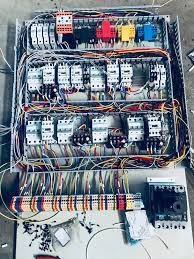Wireman Control Panel Electronics

In the realm of industrial automation and electrical systems, wireman control panel electronics play a pivotal role in ensuring efficient and safe operations. These control panels serve as the nerve center, regulating and managing various electrical components within a system. In this comprehensive guide, we will delve into the intricacies of wireman control panel electronics, exploring their components, functions, design considerations, and applications.
Understanding Wireman Control Panel Electronics:
Wireman control panels, also known as electrical control panels, are assemblies of electrical components that control the operation of machinery, equipment, or processes. These panels are designed to house various devices such as switches, relays, circuit breakers, meters, and other control elements. The primary objective of wireman control panels is to regulate the flow of electricity, monitor system parameters, and ensure the safe and efficient operation of electrical systems.
Components of Wireman Control Panel Electronics:
- Power Supply: The power supply unit is responsible for converting incoming electrical power to the appropriate voltage levels required by the system. It may include transformers, rectifiers, and voltage regulators to ensure stable and reliable power distribution.
- Circuit Protection Devices: Circuit breakers, fuses, and surge protectors are essential components in wireman control panels to safeguard against overcurrents, short circuits, and voltage spikes, thereby preventing damage to equipment and ensuring personnel safety.
- Control Devices: These include switches, push buttons, and selectors used to initiate or stop specific functions within the system. Control devices are often interfaced with relays or contactors to control larger electrical loads.
- Relays and Contactors: Relays are electromechanical switches controlled by electrical signals, whereas contactors are high-capacity switches typically used for controlling motors and other heavy loads. They enable remote or automated control of electrical circuits based on input signals from sensors or control systems.
- Programmable Logic Controllers (PLCs): PLCs are versatile digital computers used for automating industrial processes. They are programmed to perform specific tasks such as sequencing, logic operations, and data handling, making them integral to modern wireman control panel electronics.
- Human-Machine Interface (HMI): HMIs provide a graphical interface for operators to monitor system parameters, input commands, and receive feedback. Touchscreens, indicator lights, and alarms are common HMI components used in wireman control panels.
- Sensors and Instrumentation: Sensors such as temperature, pressure, level, and flow sensors are deployed within control panels to measure various physical parameters. This data is crucial for process monitoring, control, and automation.
- Communication Interfaces: Ethernet, Modbus, Profibus, and other communication protocols are employed to facilitate data exchange between control panels, PLCs, and other devices within industrial networks. These interfaces enable remote monitoring, diagnostics, and control of systems.
Design Considerations for Wireman Control Panel Electronics:
- Safety: Safety is paramount in control panel design. Adequate insulation, grounding, and protective enclosures are essential to prevent electric shock hazards and mitigate the risk of fire or equipment damage.
- Reliability: Control panels must be designed for robustness and reliability to withstand harsh environmental conditions, temperature fluctuations, and electromagnetic interference. High-quality components and proper wiring techniques are critical to ensuring long-term performance.
- Space Optimization: Control panel enclosures should be designed to optimize space utilization while accommodating the required components and wiring. Modular designs and efficient layout planning help maximize available space and ease maintenance tasks.
- Ease of Maintenance: Accessibility to components, labeling of wires and devices, and clear documentation are vital for simplifying troubleshooting and maintenance activities. Proper cable management and routing contribute to tidiness and ease of serviceability.
- Compliance with Standards: Adherence to industry standards and regulations such as National Electrical Code (NEC), International Electrotechnical Commission (IEC), and Occupational Safety and Health Administration (OSHA) guidelines is imperative to ensure the safety and legality of wireman control panel installations.
Applications of Wireman Control Panel Electronics:
Wireman control panels find diverse applications across various industries, including:
- Manufacturing: In manufacturing facilities, control panels are used to automate production processes, control machinery, and monitor production metrics such as throughput, quality, and efficiency.
- Utilities: Control panels are deployed in utility infrastructure for managing power distribution, water treatment, wastewater management, and other critical infrastructure systems.
- Building Automation: In commercial and residential buildings, control panels regulate HVAC (Heating, Ventilation, and Air Conditioning) systems, lighting, security systems, and access control.
- Transportation: Control panels are utilized in transportation systems such as railways, airports, and seaports for managing signaling, traffic control, and passenger information systems.
- Renewable Energy: Control panels play a crucial role in renewable energy generation and distribution systems, including solar farms, wind turbines, and hydroelectric plants, by monitoring power output and managing grid integration.

Conclusion:
Wireman control panel electronics are indispensable components of modern industrial and electrical systems, facilitating automation, monitoring, and control of critical processes. Understanding the components, design considerations, and applications of wireman control panels is essential for engineers, technicians, and professionals involved in electrical engineering, automation, and industrial maintenance. By leveraging advanced technologies and adhering to best practices in design and installation, wireman control panels contribute to enhanced safety, reliability, and efficiency across a wide range of industries.
